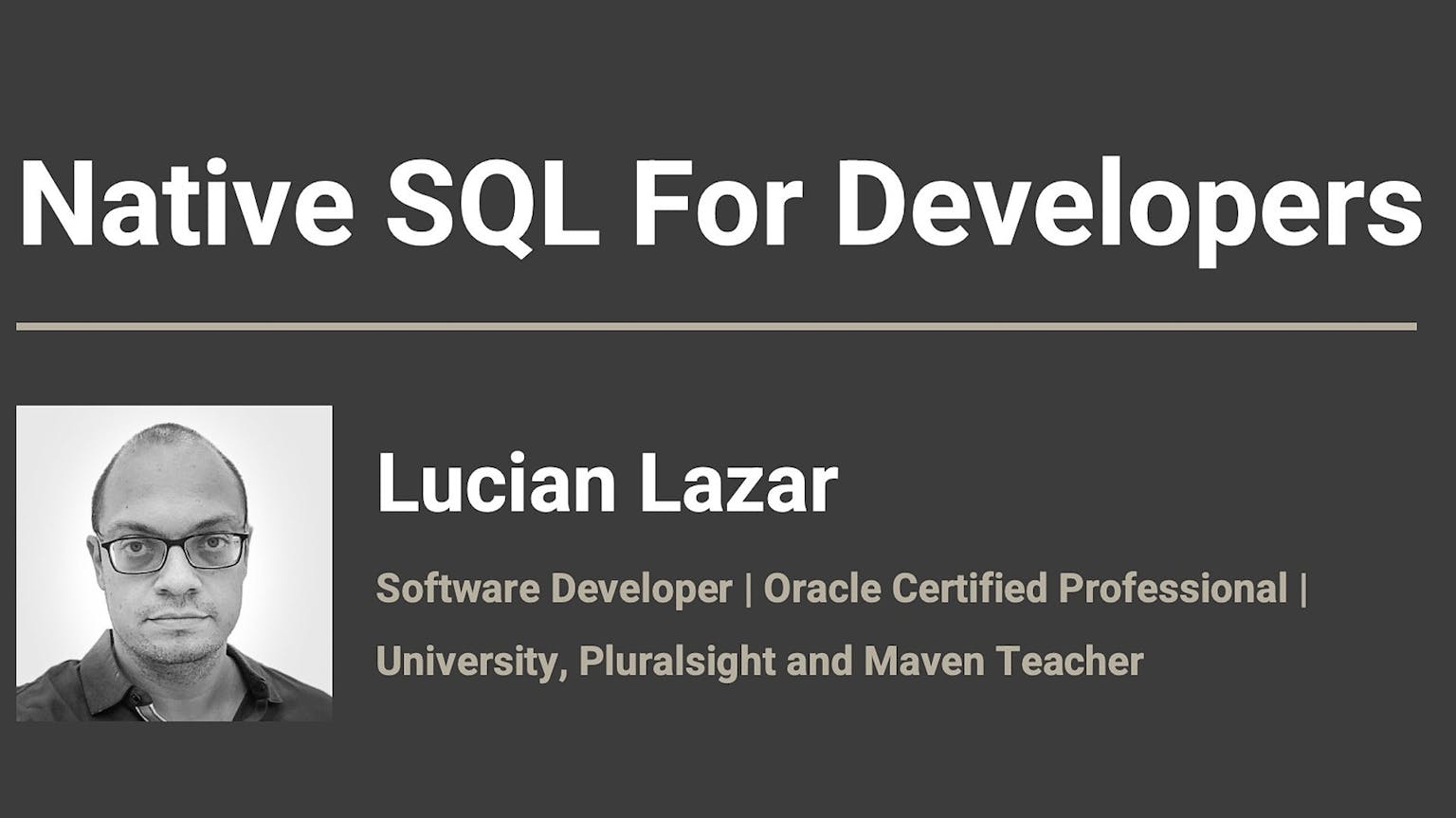Native SQL For Developers
4 Weeks
·Cohort-based Course
Develop faster applications by using native SQL instead of object-relational mapping when working with databases.
Native SQL For Developers
4 Weeks
·Cohort-based Course
Develop faster applications by using native SQL instead of object-relational mapping when working with databases.
Course overview
Native SQL For Developers
Have you ever used an ORM like Hibernate or Sequelize or SQLAlchemy and ended up with a slow database?
You will discover in this live course how using native SQL instead of object-relational mapping will help you access data faster and create faster applications.
Who is this course for
01
Back-end developers that use Java or Python and build applications with databases.
02
Front-end developers that use JavaScript or React and need to choose a database for a project.
03
Any developer that needs to use Oracle or another database and wants to be efficent.
What’s included

Live sessions
Learn directly from Lucian Lazar in a real-time, interactive format.
Lifetime access
Go back to course content and recordings whenever you need to.
Community of peers
Stay accountable and share insights with like-minded professionals.
Certificate of completion
Share your new skills with your employer or on LinkedIn.
Maven Guarantee
This course is backed by the Maven Guarantee. Students are eligible for a full refund up until the halfway point of the course.
Course syllabus
Week 1
Jan
23
Module 1: First SQL queries - Demo
Jan
25
Module 1: First SQL queries - Project
Week 2
Jan
30
Module 2: Modelling and advanced SQL queries - Demo
Feb
1
Module 2: Modelling and advanced SQL queries - Project
Week 3
Feb
6
Module 3: Functions, procedures and ETL - Demo
Feb
8
Module 3: Functions, procedures and ETL - Project
Week 4
Feb
13
Module 4: Optimize SQL queries - Demo
Feb
15
Module 4: Optimize SQL queries - Project
Do I really need this?
Why do I need to model tables myself? My ORM does this automatically.
Because you will design the tables better, using features not handled by an ORM. You will structure your data more efficiently and then you will access it faster.
Why should I learn to write SQL queries? My ORM can generate them.
The ORM generates suboptimal queries. By using native SQL you will build fast and efficient queries using the exact functions needed to acces your data.
Why do I need to learn to tune queries? The DBA can take care of this.
Why would you write slow queries and have a DBA tune them later, instead of writing them fast from the first place? You will learn the most efficient techniques to tune your SQL queries and access your data as fast as possible.
Why should I learn SQL altogether? It's an old language.
SQL is a timeless and universal language. It has been used for 50 years and it will probably be used for the next 50 years. Also, it works with all programming languages so if you learn it now, you can use it later for future projects.
When we will do this
8 live sessions, 16 hours of course
January 23rd to February 15th
Tuesdays and Thursdays from 1 PM to 3 PM
The course duration is 4 weeks, from January 23rd to February 15th. There will be 2 live sessions each week, on Tuesdays and Thursdays from 1 PM to 3 PM ET.
Group project and individual projects
Using Java, JavaScript or Python
In the first session of the week on Tuesdays we will work on a group project that uses Java code and Oracle database. In the second session of the week on Thursdays you will build your own projects using Java, JavaScript, Python or another language you prefer.
Meet your instructor
Lucian Lazar
Lucian Lazar
Software Developer | Oracle Certified Professional | University, Pluralsight and Maven Teacher
I have over 15 years experience in software development and teaching, so I will share with you both the basic academic concepts and the practical experience from industry. My current position is Database Developer at Optymyze maintaining a top sales application. I am Teaching Assistant for a top university in Romania on courses of databases and programming. I also teach databases courses for Pluralsight and here at Maven. You can see more details on my website and on my Linkedin profile.
The idea of this course came to me after presentations and coaching sessions with fellow developers. I was amazed of how easy it was for me to show them that native SQL improves the performance of accessing data and how much they improved their skills in working with databases after the sessions. I held this course with colleagues and with developers from other companies. You can see from their testimonials how they reached the outcomes of the course, how they improved the quality of their code and the speed of their applications.
See what people are saying
Dan Tofan
Adrian Banu
Sabina Macarie
Sneha Hiremath
Maxim Rohit
Stefan Popa
Learning is better with cohorts
Active learning, not passive watching
This course builds on live workshops and hands-on projects
Interactive and project-based
You’ll be interacting with other learners through breakout rooms and project teams
Learn with a cohort of peers
Join a community of like-minded people who want to learn and grow alongside you
